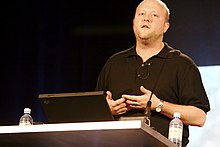A lightweight markup language (LML), also termed a simple or humane markup language, is a markup language with simple, unobtrusive syntax. It is designed to be easy to write using any generic text editor and easy to read in its raw form. Lightweight markup languages are used in applications where it may be necessary to read the raw document as well as the final rendered output.

Markdown is a lightweight markup language for creating formatted text using a plain-text editor. John Gruber and Aaron Swartz created Markdown in 2004 as a markup language that is intended to be easy to read in its source code form. Markdown is widely used for blogging and instant messaging, and also used elsewhere in online forums, collaborative software, documentation pages, and readme files.
Windows Live Toolbar was a browser extension toolbar for Internet Explorer. It superseded MSN Search Toolbar. Windows Live Toolbar provided a simple search interface that starts to list results as the user types in a search query and uses Bing as its search engine. The toolbar also allows users to synchronize their Internet Explorer favorites across multiple computers and provides an interface to Windows Live and MSN services.

GitHub is a developer platform that allows developers to create, store, manage and share their code. It uses Git software, providing the distributed version control of Git plus access control, bug tracking, software feature requests, task management, continuous integration, and wikis for every project. Headquartered in California, it has been a subsidiary of Microsoft since 2018.

Etherpad is an open-source, web-based collaborative real-time editor, allowing authors to simultaneously edit a text document, and see all of the participants' edits in real-time, with the ability to display each author's text in their own color. There is also a chat box in the sidebar to allow meta communication.

OsmAnd is a map and navigation app for Android and iOS. It uses the OpenStreetMap (OSM) map database for its primary displays, but is an independent app not endorsed by the OpenStreetMap Foundation. It is available in both free and paid versions; the latter unlocks the download limit for offline maps and provides access to Wikipedia points of interest (POIs) and their descriptions from within the app. Map data can be stored on the device for offline use. Using the device's GPS capabilities, OsmAnd offers routing, with visual and voice guidance, for car, bike, and pedestrian. All of the main functionalities work both online and offline.

RStudio is an integrated development environment for R, a programming language for statistical computing and graphics. It is available in two formats: RStudio Desktop is a regular desktop application while RStudio Server runs on a remote server and allows accessing RStudio using a web browser. The RStudio IDE is a product of Posit PBC.

knitr is an engine for dynamic report generation with R. It is a package in the programming language R that enables integration of R code into LaTeX, LyX, HTML, Markdown, AsciiDoc, and reStructuredText documents. The purpose of knitr is to allow reproducible research in R through the means of literate programming. It is licensed under the GNU General Public License.

The Windows Package Manager is a free and open-source package manager designed by Microsoft for Windows 10 and Windows 11. It consists of a command-line utility and a set of services for installing applications. Independent software vendors can use it as a distribution channel for their software packages.
Pandoc is a free-software document converter, widely used as a writing tool and as a basis for publishing workflows. It was created by John MacFarlane, a philosophy professor at the University of California, Berkeley.

Open Live Writer is a free and open-source desktop blogging application released by .NET Foundation. It is a fork of Windows Live Writer 2012 by Microsoft. Open Live Writer features WYSIWYG authoring, photo-publishing and map-publishing functionality, and is currently compatible with WordPress.com, WordPress (hosted), and Blogger, with support for more platforms planned. The application's source code is available on GitHub under the MIT License.
Yihui Xie is a Chinese statistician, data scientist and software engineer who formerly worked for RStudio. He is the principal author of the open-source software package Knitr for data analysis in the R programming language, and has also written the book Dynamic Documents with R and knitr.

Keras is an open-source library that provides a Python interface for artificial neural networks. Keras acts as an interface for the TensorFlow library.

A notebook interface or computational notebook is a virtual notebook environment used for literate programming, a method of writing computer programs. Some notebooks are WYSIWYG environments including executable calculations embedded in formatted documents; others separate calculations and text into separate sections. Notebooks share some goals and features with spreadsheets and word processors but go beyond their limited data models.

Project Jupyter is a project to develop open-source software, open standards, and services for interactive computing across multiple programming languages.

Netlify is a remote-first cloud computing company that offers a development platform that includes build, deploy, and serverless backend services for web applications and dynamic websites. The platform is built on open web standards, making it possible to integrate build tools, web frameworks, APIs, and various web technologies into a unified developer workflow.
Microsoft, a technology company historically known for its opposition to the open source software paradigm, turned to embrace the approach in the 2010s. From the 1970s through 2000s under CEOs Bill Gates and Steve Ballmer, Microsoft viewed the community creation and sharing of communal code, later to be known as free and open source software, as a threat to its business, and both executives spoke negatively against it. In the 2010s, as the industry turned towards cloud, embedded, and mobile computing—technologies powered by open source advances—CEO Satya Nadella led Microsoft towards open source adoption although Microsoft's traditional Windows business continued to grow throughout this period generating revenues of 26.8 billion in the third quarter of 2018, while Microsoft's Azure cloud revenues nearly doubled.

Windows Terminal is a multi-tabbed terminal emulator developed by Microsoft for Windows 10 and later as a replacement for Windows Console. It can run any command-line app in a separate tab. It is preconfigured to run Command Prompt, PowerShell, WSL and Azure Cloud Shell Connector, and can also connect to SSH by manually configuring a profile. Windows Terminal comes with its own rendering back-end; starting with version 1.11 on Windows 11, command-line apps can run using this newer back-end instead of the old Windows Console.

R packages are extensions to the R statistical programming language. R packages contain code, data, and documentation in a standardised collection format that can be installed by users of R, typically via a centralised software repository such as CRAN. The large number of packages available for R, and the ease of installing and using them, has been cited as a major factor driving the widespread adoption of the language in data science.
Lose It! is an American health and wellness mobile app developed by FitNow, Inc. The app generates calorie budgets for users by tracking weight, exercise, food and calorie intake, and personal goals, primarily to assist them in achieving weight loss.













